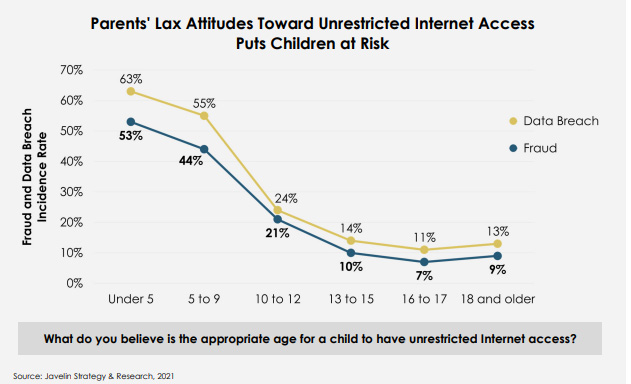
Although modern-day teens and tweens are more tech savvy than previous generations, they are also increasingly targeted for online scams. Between 2017 and 2021, the number of young people under 20 scammed online increased over 1,000%. This represents a loss of nearly $1 million.
As a parent, the goal is not to frighten your child about being online, but rather to encourage safety and caution, as you would when talking to your child about any other public venue. The internet can be a great resource for your child’s education and entertainment, but in order to stay safe, your child needs to understand that a stranger online is anyone they have never met in person.
The following are common online scams targeting children and teens and what parents and caregivers can do to protect young people.
With sextortion scams, adults pose as teens. Sometimes the scammers are other teens who know the victim and are engaging in online bullying, also known as cyberbullying. They make their victims believe they are in a relationship. This is the catfishing part of the scam when someone poses as someone else and/or forms a fake relationship with their victim. The sole purpose of the relationship is exploitation.
The catfisher, playing upon the victim’s emotions, then convinces their victims to take explicit pictures of themselves or engage in texting with sexually explicit content. After the child sends pictures or texts, the scammer then demands money and threatens to expose the young person by sharing the pictures or texts online. This is sextortion.
You can shield your child from this kind of abuse by teaching them that people online are strangers. Even if it is someone they know from school, your child should never communicate with anyone online in secret. Just as you would encourage your child to talk about anything that happens in person that makes them uncomfortable, you can also do the same about any contact they have online.
All the information young people need to apply for scholarships and admission to colleges, universities, technical schools is free and online. There are some reputable companies that offer assistance in this process, but other companies promise to help and then don’t fulfill their promises.
Some clues that the company might be perpetrating a scam include using high-pressure sales techniques, guarantees of college admission, or promising to reveal guaranteed scholarships after receiving credit card information. Other companies charge $1,000 or more for a guaranteed scholarship, then offer the student a $200 scholarship. No reputable company would guarantee admission or scholarships.
Tweens and teens are online for several hours per day. In that time, they are bombarded with ads for a wide range of products and services. Some companies, particularly ones not based in the United States, fraudulently offer products, such as clothes. Sometimes, the clothes never arrive. At other times, when the clothes arrive, they look nothing like the pictures of the clothes.
Most companies that have products that would appeal to your child also have reviews. Check the online reviews. Avoid ordering from companies with negative reviews or companies that haven’t been reviewed. Discourage your child from placing online orders without your supervision.
You may not know that children under 13 are over 50 times more likely to have identities stolen than adults. Children’s identity theft occurs when someone acquires the child’s Social Security number and uses it fraudulently to open a bank account, get loans, or apply for credit cards.
Protecting children from identity fraud calls for vigilance from parents and other responsible adults. It’s a highly profitable scam that is hard to detect. It is important that parents know who their child communicates with online and that they don’t share Social Security numbers with anyone or use them as passwords.
Phishing occurs when scammers send emails or texts, posing as a legitimate business or person the child might know, such as a teacher. Sometimes the email or text promises to send a free product, such as a game or wallpaper. Many of the app store scams occur due to emails that look like they are from a computer company.
For example, the email may look like it’s from Apple, but there may be a misspelling of Apple or the web address listed on the email may have a few letters that are different from the actual Apple website. The goal of phishing email is to get someone to click onto a fake link so personal information can be acquired.
You can teach your child to recognize phishing emails and texts. Let them know that legitimate organizations will not contact them for personal information, to not respond to offers of free products, and to never respond to any email that appears suspicious.
Teach your child to recognize fraudulent websites
Websites with misspelled words in the URL or in the website content are red flags for fraudulent sites. You can also increase your child’s online safety by blocking pop-ups and requiring a parent’s permission to approve purchases.
Don’t share passwords, even with friends
Teach your child to never share passwords with anyone other than you. Sharing a password with a friend could result in identity theft, should the friend lose control of the password.
Don’t share personal information
Be specific when talking to your child about personal information. They should know that their personal information includes the name of their school, their Social Security number, telephone number, address, and any kind of banking information.
Don’t communicate with anyone in secret
Your child should feel comfortable talking to you about the people they communicate with online. They should tell you immediately if anyone asks them to keep secrets or do anything that makes them feel uncomfortable.
Check and freeze your child’s credit report
Your child should not have a credit report, but if they do, check the report for credit accounts that they did not open. Credit reports can be checked free of charge through any of the major credit reporting agencies, such Experian, TransUnion or Equifax. You can also freeze the report, which will prevent anyone else from checking or using your child’s credit.
Don’t over-post about your children
The more you post about your children, the more likely they are to be victimized by online scams. Parents should be mindful of the content of what they post and avoid revealing personal details about the child. It won’t make sense to your child if you post personal information when you’ve told them not to do it. It is important to set a good safety example for your children with your online use.
Stay involved with your child’s internet use
Numerous studies show that parents who do not monitor their child’s internet use leave their children more vulnerable to online scams. This chart from Javelin illustrates how closely allowing your children unrestricted access to the internet correlates with fraud and data breach incidents:

Monitoring can include manually checking search histories or using apps like BrightCanary that will independently screen your child’s internet usage.
Some parents talk to their children about online safety, then ask them to sign an agreement on how they will safely use the internet. You can customize our Digital Device Contract Template to create an agreement to get started; signing an agreement is one way your child can take ownership of their responsible internet usage.
If you think your child has been the victim of a scam, it is important to report it. Contact one of the following agencies:
For sextortion or other forms of online abuse: Contact the your local FBI field office or call 1-800-CALL-FBI or report it online tips.fbi.gov.
For financial scams: Contact your bank and report the scam. Ask your bank to reverse the charges, then report the scam to the Federal Trade Commission. You can report the scam online or by calling 1-877-382-4357.